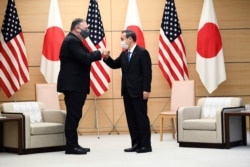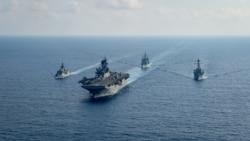U.S. Secretary of State Mike Pompeo denounced China’s “exploitation, corruption, and coercion” Tuesday as he participated in a high-level forum of Asian leaders that Washington hopes will counter Beijing’s growing influence.
The meeting in Tokyo of the Quad grouping of nations - the United States, Japan, India, and Australia - comes amid increasing regional frustration about China’s lack of transparency over the coronavirus outbreak and increased assertiveness toward its neighbors.
“As partners in this Quad, it is more critical now than ever that we collaborate to protect our people and partners from the CCP's exploitation, corruption and coercion,” Pompeo said at the outset of the forum, referring to the Chinese Communist Party.
Pompeo, whose trip was cut short following President Donald Trump’s coronavirus diagnosis, wore a large, American flag-themed face covering and bumped fists with other Quad leaders, whom he met individually before the wider forum began.
Speaking to Japanese news outlets earlier Tuesday, Pompeo used unusually blunt terms to describe the Quad, which China has long suspected of being the start of a grand coalition meant to contain its rise.
Pompeo told the Nikkei Asian Review that the regional grouping was a “fabric” that could “counter the challenge that the Chinese Communist Party presents to all of us.”
“Once we’ve institutionalized what we’re doing - the four of us together - we can begin to build out a true security framework,” Pompeo told Nikkei, adding that other countries could become a part of the fabric at the “appropriate time.”
The United States has for years tried to persuade its Asian allies and partners to more firmly and collectively counter China, which Washington says is a growing threat to regional stability. Those efforts have been hampered by China’s economic clout.
Japan, Australia, and India - all of which maintain crucial economic ties with China - frequently downplay the notion the Quad is meant to contain Beijing, instead focusing on the positive aspects of what they describe as a consultative security mechanism between like-minded democracies.
In the public statements Tuesday, other Quad members appeared much more reluctant to criticize China. In a sign of the limitations of the gathering, the countries were not expected to release a joint communique. Instead, each country is expected to release its own statement.
The Quad first met in 2004, but fizzled out several years later following pushback from China. The Trump administration helped revive the Quad in 2017, as U.S.-China ties worsened. The talks have since been upgraded to ministerial-level discussions - a sign that all sides want to move the dialogue forward, according to analysts.
China tensions
The meeting comes at a moment of regional tension with China. Not only is there widespread anger related to the coronavirus, which originated in China, there are also lingering concerns about China’s more aggressive approach to territorial disputes in the East and South China Seas. And on China’s Himalayan land border with India, recent clashes have killed at least 20 Indian soldiers along with an undisclosed number of Chinese.
As a result, even Quad members like India, which have historically been reluctant to push back too firmly against China, are rethinking their stance, says Jagannath Panda, a research fellow who specializes in East Asia at the New Delhi-based Manohar Parrikar Institute for Defence Studies and Analyses.
“India follows a non-aligned foreign policy. It never wanted the Quad to emerge as a military or maritime-centric institution. But the way the problems with China have emerged on boundary issues, India is definitely changing its game plan,” Panda told VOA. “India will be eager to push forward the Quad more as a formal, institutionalized process.”
Australia, too, has become embroiled in a major dispute with China. After Australia's government called for an independent investigation into the origins of the coronavirus, China imposed restrictions on key Australian exports such as beef and wine. There have also been allegations of increased Chinese domestic interference in Australia.
“From Australia’s perspective, I think there’s more appetite among policymakers to push back against China, largely because of the perception that the Chinese have become more aggressive in targeting Australians through espionage,” says Andrew O’Neil, a professor at Australia’s Griffith University.
Out of the four Quad countries, Japan currently has the best relations with China, says O’Neil. That is a change for Tokyo, which has long been one of the most vocal supporters of the security grouping.
Japan’s new prime minister, Yoshihide Suga, is expected to take a more cautious initial approach to China. But some analysts say a quasi-alliance with fellow democracies India and Australia may represent a safer way for Japan to push back against Beijing.
Limitations
U.S. officials have recently expressed an interest in expanding the scope and membership of the grouping, with some even envisioning an eventual “Asian NATO.” But many have doubts that a binding, NATO-like military alliance will emerge any time soon.
“Quad membership is driven by shared interests, not binding obligations,” said David Stilwell, the top U.S. diplomat for East Asia, ahead of Pompeo’s trip.
But Quad partners, he insisted, will “stand up against (China’s) efforts to bully its neighbors.”
While the U.S., Japan, India, and Australia all agree to some extent that China is a threat, observers say they don’t agree on exactly what to do about it.
“The China factor no doubt unites most of the Quad members,” concedes Panda, the New Delhi-based analyst. “Equally it also divides most of the Quad members.”
When it comes to dealing with China, “there is absolutely no common agreement among the Quad countries, forget the Quad Plus countries,” he says, referring to possible additions to the group.
The complex web of competing economic interests and rivalries in Asia has made it difficult for even some formal U.S. allies to choose between the U.S. and China. Many say the choice does not need to be made at all.
Asked earlier this month about the hypothetical idea of joining an expanded Quad, South Korean Foreign Minister Kang Kyung-wha reacted negatively.
"We don't think anything that automatically shuts out, and is exclusive of, the interests of others is a good idea,” she said, according to the Yonhap news agency. "If that's a structured alliance, we will certainly think very hard whether it serves our security interests.”







